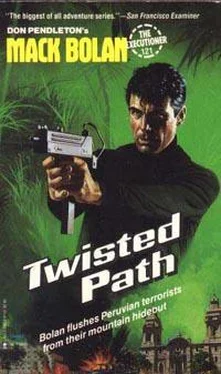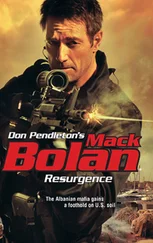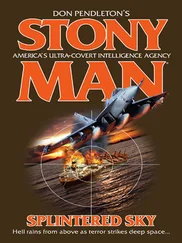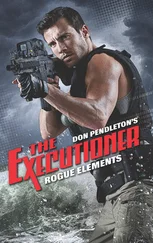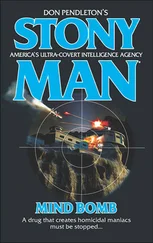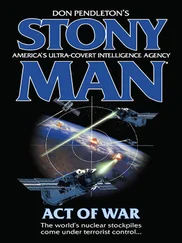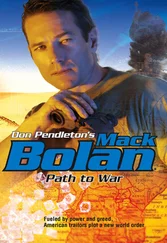Carrillo sighed again, a mournful sound like wind whistling through a canyon, and reached for the phone. His boss would be very displeased.
Mack Bolan arrived in Lima feeling a little on the naked side. Airport security being as strict as it was these days, it was seldom worth the risk to try to smuggle a gun aboard. It didn't fit in with the big man's plans to spend the next few years in jail.
His second task would be to get hold of a weapon. The first was to make sure that he wasn't followed to his hotel.
Bolan scanned the waiting crowd at the airport as the bored customs officer checked him through, approving Michael Blanski's passport without question.
He had left a storm brewing when he departed from San Francisco. Kline had been distressed, to put it mildly, when he learned of the carnage that Bolan had left in his wake. The agent had been strongly inclined to have Bolan locked away for murder. It had taken some arm twisting by Brognola to convince Kline that this was something he had better keep his nose out of.
The Bureau man had agreed reluctantly, but Bolan wasn't entirely sure that he trusted Kline's word. It was possible that Michael Blanski might have to be retired as a viable alias.
In the meantime, Bolan had no intention of worrying about things that he couldn't control. Right now staying alive in Peru required all of his attention. He would operate as though he were in a hostile environment until circumstances proved otherwise.
He walked to the string of cabs ranged outside the terminal and picked the third one in line, ignoring the shouts from the first two drivers. He waved an American fivedollar bill at the startled cabbie. "Go. Now."
The cab shot from its position in line to a crescendo of horns. Given that the average annual wage in Peru was only about seven hundred dollars, as a free-spending American Bolan held an immediate advantage. Almost everything was for sale if an agreement could be reached without offending Latin machismo.
He had the driver head toward the city, instructing him to turn right and left aimlessly as he watched through the rear window for signs of surveillance. At random he changed taxis twice more before he gave instructions to drive to a hotel not far from the Plaza de Armas.
The hotel itself was nondescript, the sort frequented by budget-conscious travelers with North American tastes. He checked in as David Bowes, not wishing the name Blanski to be traceable to a hotel in case anyone was looking. When the clerk asked for his passport, Bolan deflected the request with a subtly proffered twenty, explaining that he seemed to have dropped his identification at the airport and would have to go to the American embassy for a replacement. But of course that would take some time.
The clerk graciously accepted the explanation and the money.
Bolan hit the streets after stowing what little gear he had brought. He crossed the Plaza de Armas, where guards strutted in front of the Palace of Government, also known as Pizarro's House. The guards glittered in silver helmets, crisp, snow-white jackets, red pantaloons and polished jackboots, uniforms inspired by Napoleonic splendor. But very modern rifles were slung over their shoulders.
At the second intersection Bolan angled away from the plaza, delving farther into the narrow streets that lined the core of the city.
The side streets were jammed with ambulantes, the sidewalk vendors who crowded the city peddling food and goods. The big man, easily recognisable as a tourist, was offered alpaca ponchos, skewers of beef heart and ewers of murky red "iguana blood," and even what were supposed to be genuine pre-Columbian artifacts. Bolan brushed by the outstretched hands of the vendors, intent on following the directions Brognola had given him for the prearranged meeting.
Apart from the street merchants in their rough clothes, shoeshine boys, wandering minstrels and tour guides competed incessantly for his attention and his funds.
Once, as Bolan dodged around a girl who suddenly appeared in his path, he felt a skinny hand snake into his pants pocket. Bolan's hand darted out to grab the invader. A frightened, ragged boy of about eight stared wide-eyed at the tall man, afraid that the American would drag him to the police.
Bolan stared back for a moment and released the thin wrist. The child was lost in the crowd in seconds.
He continued on for another few blocks before stopping at a small shop called the Lore of the Incas. Inside, the tiny store was jammed to the ceiling with books, postcards and plaster replicas of Inca treasures. A glass case that supported a battered cash register held a scale model of Machu Picchu, the lost city of the Incas. A grinning proprietor stood behind the case.
"Do you have any Plazca pottery?" Bolan asked.
"Any particular era?" the shopkeeper inquired.
Bolan shook his head. "It's for a friend."
"Is this a Washington friend?"
"That's right." Bolan hated the question-and-answer games, but Brognola had insisted on the contact procedure.
The owner drew a six-inch pottery statue from a cupboard behind the cash. The idol examined Bolan from wide owl eyes on either side of a flat nose.
"This should be to your satisfaction." He slipped it into a plastic bag.
Bolan left a fifty-dollar bill on the cash register and departed with his purchase.
Back in his hotel room, Bolan examined the statue more closely, failing to find an imperfection in the glazed surface. He dropped the statue, turning it into rubble. Picking through the fragments, Bolan extracted a flat key.
He took a taxi to the main shopping area, absorbed in the passing scenery. It was surprising how little of the past had survived the modernisation of Lima. Although it was older than any North American city, few reminders existed of its ancient heritage. The only signs of the long-forgotten Incas were advertisements for Inca cigarettes and Inca cola. The relatively recent Spanish influence showed in the multiplicity of churches. The cathedral held the remains of Francisco Pizarro, the soldier-adventurer who had humbled the last of the proud Inca kings.
Bolan got out of the cab at a mall in the ritzy shoppingarea frequented by the Peruvian elite, the Camino Real. Stepping inside under the eyes of vigilant security guards, he turned to a bank of yellow lockers lining a far wall. The key rewarded him with a solid black bag in a bottom locker.
In the privacy of his hotel room once again, Bolan smiled as he unpacked the bag. Some embassy staffer must have gotten a thrill out of delivering this particular package.
Brognola had come through as he had promised. A diplomatic pouch had forwarded a Beretta 93-R and a machine pistol, as well as fifteen clips for each and a shoulder holster for the pistol. Twenty-thousand dollars in crisp new bills provided pad money, hush money and pocket change for his stay.
Bolan felt a lot better with the weight of the Beretta under his arm as he dialed Carrillo. After exchanging pleasantries, they arranged to meet at a restaurant south of the Camino Real.
He arrived early, taking a seat in a corner near a fire exit. His eyes scanned the doorway and the plate-glass window that looked onto the wealthy streets of the suburb of San Isidro.
The crowds streaming by weren't much different from similar crowds in Paris or Madrid. For the most part, the women were fair-skinned criollas, dark haired and flashing eyed, of nearly pure Spanish descent. Others were marked as mestizas, the issue of the Spaniards and the native Indians. Many of these displayed dark red good looks that attracted the eyes of the men striding along as imperiously as conquistadores. Occasionally a native Indian would walk by, eyes downcast, garbed in a colorful poncho and a felt hat, looking as out of place among the stylish shoppers as an elephant at a horse show.
Читать дальше
